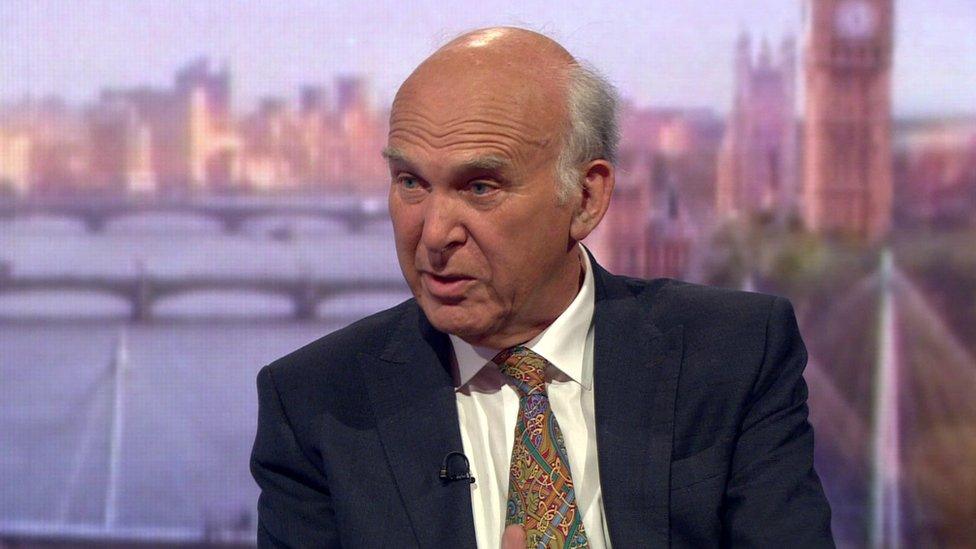The Vince Cable story: Profile of new Lib Dem leader
- Published
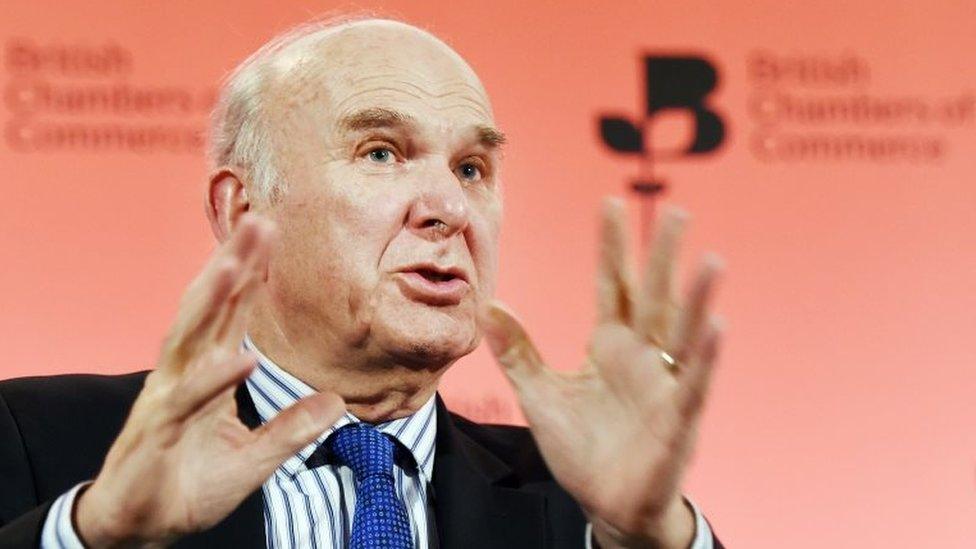
Sir Vince Cable has been crowned leader of the Liberal Democrats without a contest - this is the story of how he got there.
He is one of the most recognisable faces in British politics: a former minister in the coalition government, a ballroom dancing enthusiast who did Strictly before Ed Balls, a financial guru noted for predicting the economic crash and now, at the age of 74, the leader of what used to be known as the third force in British politics.
As someone who was a leading player during the coalition years, and who paid the price for it by losing his Commons seat in 2015, he will know better than anybody the scale of the task facing him.
The Lib Dems have just 12 MPs. Sir Vince has conceded that the party's decision to campaign hard for a second referendum on the terms of the Brexit deal did not "cut through" at the general election.
But he believes the party's time will come again, when it begins to dawn on the public that leaving the EU is a terrible mistake and has harmed the economy. He aims to lead the charge in Parliament against what he sees as Theresa May's reckless pursuit of a "hard Brexit," joining forces with Remainer Tories to frustrate the passage of key pieces of legislation.
His mild manner - impressionists have compared his voice to that of the soft-hearted prison officer Mr Barrowclough in the 70s sitcom Porridge - masks a shrewd and steely operator, with a knack for generating publicity.
Even before easing into the seat vacated when Tim Farron felt compelled to resign as leader, he was grabbing column inches and stirring up social media controversy, telling the BBC's Andrew Marr show he thought Brexit might never happen.
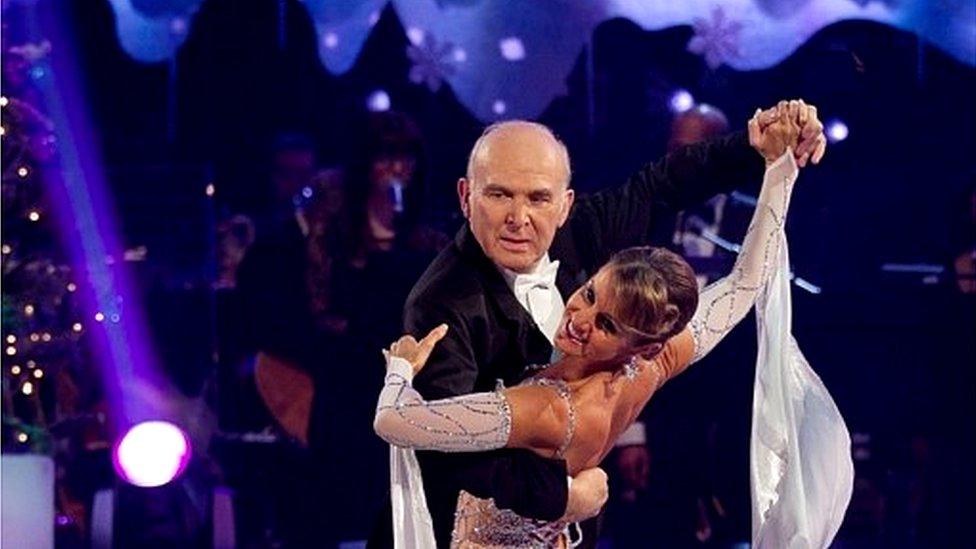
It was this tendency to speak his mind, with one eye on the headlines, that drove some of his Conservative coalition colleagues to distraction during his years in government.
At times, Sir Vince, or plain old Mr Cable as he was known then, gave the impression of a man being held captive by enemy forces.
He baffled Tory MPs with his first Lib Dem conference speech as business secretary, in which he attacked capitalism, accusing it of killing competition.
He branded the Conservative stance on immigration "nasty" and "ugly" and fought a long-running battle with then Home Secretary Theresa May over immigration curbs on students and non-EU workers, which he believed would be disastrous for the UK economy.
But it was comments he never meant to be heard publicly that landed him in the most trouble, when in December 2010 he told undercover reporters he could bring down the coalition at any point by walking out - and how he had to "battle" to curb Tory excesses and promote his own party's agenda.
He called the coalition's attempts to push through changes in the health service, local government and other areas a "kind of Maoist revolution", which was "in danger of getting out of control".
Most damagingly, he told the undercover Daily Telegraph reporters he had "declared war on Rupert Murdoch" and planned to block the media baron's efforts to take full control of BSkyB.
The remarks led to him being stripped of his powers to make a decision on the BSkyB bid - and were criticised by Downing Street as "totally unacceptable and inappropriate".
But the fact that he remained business secretary may have proved his point about being unsackable.

Who is Sir Vince Cable?
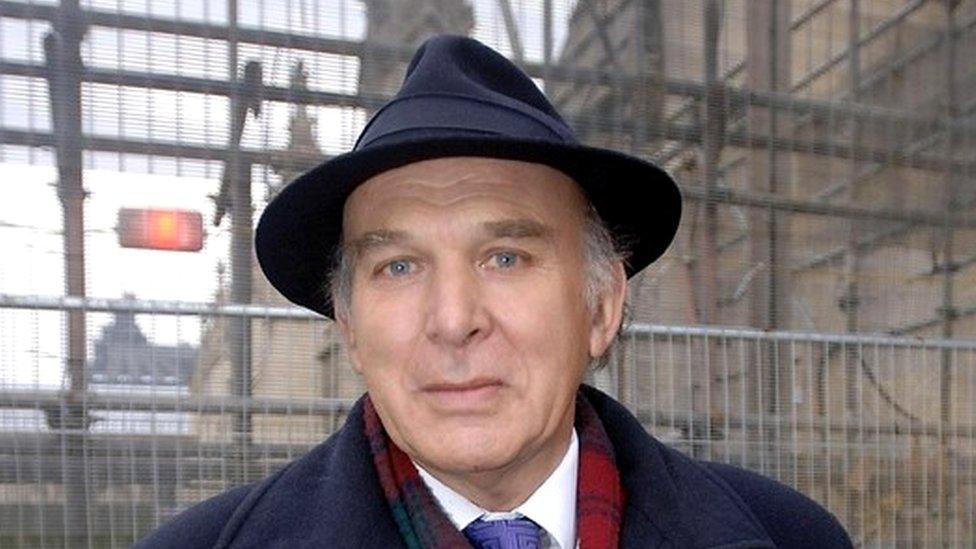
Date of birth: 9 May 1943
Education: Grammar school, Cambridge university
Family: Father of three grown-up children by his first wife, Olympia, who died in 2001. Remarried in 2004. Eldest grandson, Ayrton Cable, launched the Humanitarian Water and Food Youth Award at the age of 11, in front of 12,000 young people at Wembley
Job before politics: Economist, lecturer and adviser to the Kenyan government and senior Labour politicians. Chief economist at oil giant Shell.
Political career: A Labour councillor in Glasgow in the 1970s, who joined the SDP in 1982 and then won his Twickenham seat for the Lib Dems at the second attempt in 1997. Stood in as Lib Dem leader when Sir Menzies Campbell quit in 2007, was business secretary in the coalition government between 2010 and 2015, before losing his seat. Returned to the Commons in June. Knighted in 2015.
Off duty: Ballroom dancing and writing - he is about to publish his first novel, a political thriller about a post-Brexit future called Open Arms.

Sir Vince was a contemporary of Ken Clarke, Michael Howard and Norman Lamont - some of the Tory "big beasts" of the 1990s - while at Cambridge University.
But he did not follow them on the fast track to Parliament.
A grammar school boy from York, he initially joined the Liberal Party but, after university, defected to Labour. He fought for the Glasgow Hillhead seat at the 1970 election, losing. As a Labour councillor in Glasgow he contributed to The Red Paper on Scotland, edited by Gordon Brown in 1975.
In 1982, Sir Vince changed party once more, this time opting for the newly formed Social Democratic Party. He made failed attempts to run for Parliament in 1983 and 1987.
After the SDP and the old Liberal Party merged to form the Liberal Democrats in 1988, Sir Vince was unsuccessful in another bid to become an MP in 1992.
It was not until the anti-Tory landslide of 1997 that he finally won the seat of Twickenham, south-west London.
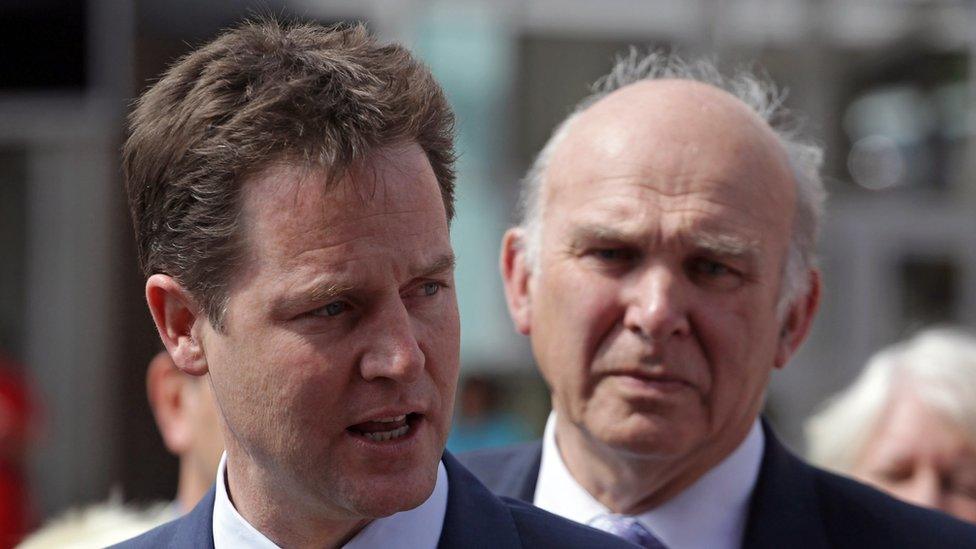
Along the way, he worked as an economics lecturer, at the Foreign Office, as a special adviser to future Labour leader John Smith, an official in the Kenyan government and as chief economist for the oil company Shell.
Once in Parliament, his political career went comparatively smoothly, with promotion to the Lib Dem front bench in 1999 and to Treasury spokesman in 2003.
In this influential role he made pronouncements on the unsustainability of Labour's long economic boom - comments which saw his reputation rise following the arrival of the credit crunch. He was also one of the first senior politicians to call for Northern Rock to be nationalised.
Sir Vince helped to oust Lib Dem leader Charles Kennedy in 2005, but it was after Mr Kennedy's successor, Sir Menzies Campbell, resigned after two years in the job, that Sir Vince became a household name.
Having been elected deputy leader, he stood in at prime minister's questions and in a memorable exchange mocked Gordon Brown, remarking on the then prime minister's "remarkable transformation in the last few weeks from Stalin to Mr Bean, creating chaos out of order rather than order out of chaos".
Laughter rang around the Commons chamber and a man previously seen as a rather dry figure was instantly transformed into a budding media star.
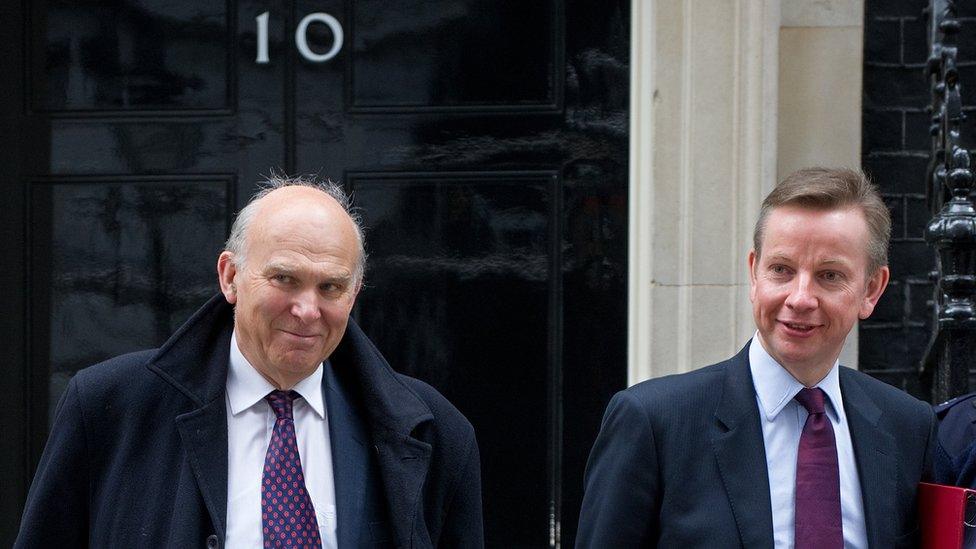
By the 2010 election he was a familiar face on the nation's TV screens, cultivating a reputation as one of the few front-ranking politicians who had warned about the looming financial crisis in 2008.
When David Cameron failed to win an overall majority, there were suggestions he might become chancellor under the Tory-Lib Dem government that emerged from coalition talks.
However, the job went to George Osborne and Sir Vince was given the business brief - in charge of a department he had previously suggested should be abolished.
Sir Vince's most controversial task was to oversee the rise in university tuition fees to a maximum of £9,000 a year.
This came despite the Lib Dems signing a pre-election pledge to oppose any such move, which made him and party leader Nick Clegg the focus of much anger.
Sir Vince voiced doubt about whether he should back the plans in Parliament. Eventually he and all his Lib Dem ministerial colleagues did so, in the face of a large rebellion by the party's backbench MPs.
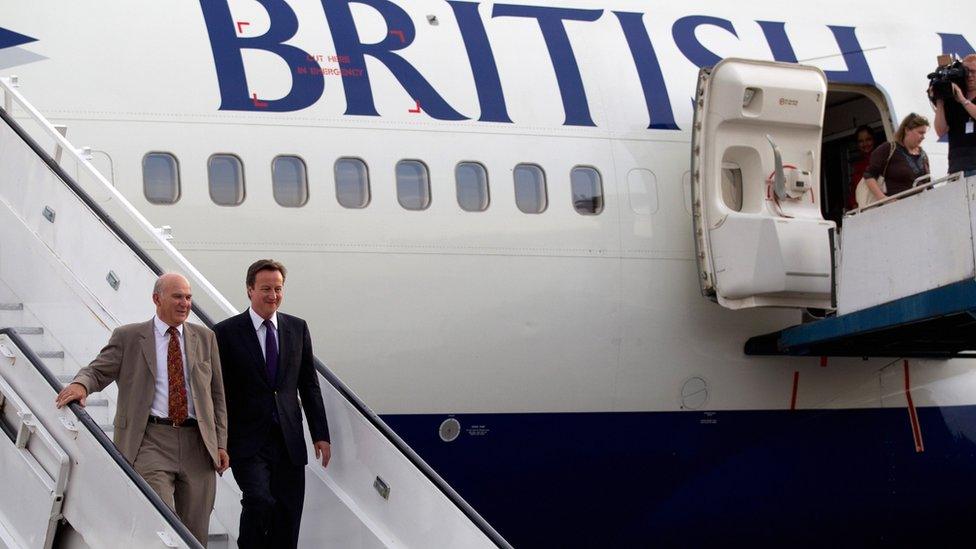
The Lib Dems have still not recovered from the reputational hit they took over tuition fees, although Sir Vince continues to defend the policy to this day, telling Sky News earlier this month , externalthat scrapping fees would be a "cheap populist gesture" that would create an unfair system, adding that the "40% of students" who go to university should not be subsidised by the "60% who don't"
He also oversaw the controversial privatisation of the Royal Mail, which was criticised by the National Audit Office as being sold off too quickly and cheaply, after shares soared 70% above their original price.
Sir Vince insisted the sale had delivered "value for money" for taxpayers.
His political career appeared to have come to an end in 2015, when he was ejected from Parliament by the voters of Twickenham.
Never one to rest on his laurels, he threw himself into his hobby of ballroom dancing - in 2010 he had taken part in the BBC's Strictly Come Dancing Christmas special - entering the British National Dance Championships, after taking lessons at the dance studio of his Strictly dance partner Erin Boag.
He also started work on a novel, after previously hitting the best seller lists with The Storm, an explanation of the 2008 world financial crash and how Britain should respond to it.
Sir Vince is the father of three grown-up children by his first wife, Olympia, who was from Kenya. It was a mixed-race marriage, which saw Sir Vince defying his father, who told him such unions "didn't work".
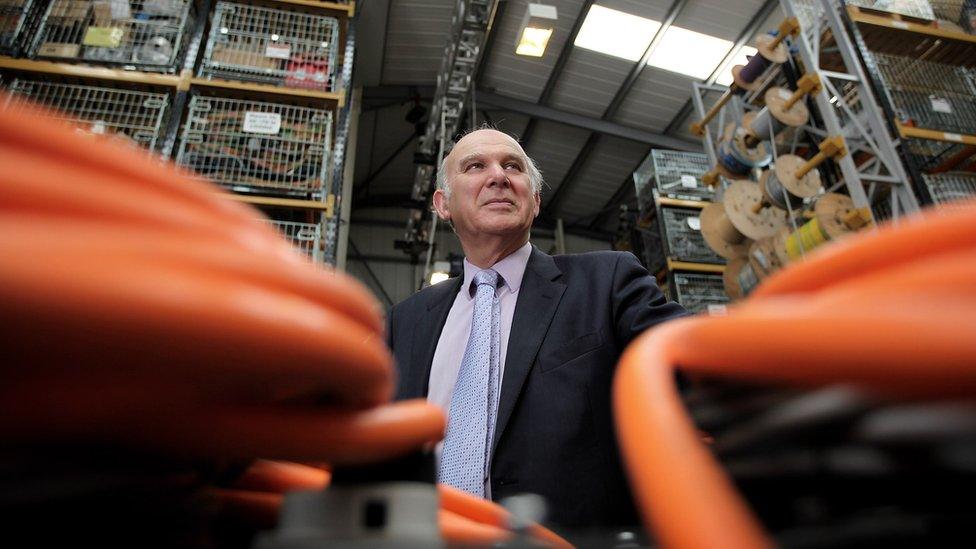
After Olympia was diagnosed with cancer for a second time in the 1990s, he combined the roles of being an MP and her carer until her death in 2001.
Sir Vince remarried in 2004, to Rachel Smith, a farmer from the New Forest who had been at Cambridge with him. He wears the wedding rings from both of his marriages.
He won back his Twickenham seat in June's snap election and when Tim Farron unexpectedly announced he was quitting as Lib Dem leader, saying he could not reconcile the role with his Christian faith, Sir Vince decided to stand for a job he had long coveted.
When potential rivals ruled themselves out, it became clear that he would be crowned leader without a contest.
Sir Vince has brushed off concerns about his age by referring to Sir Winston Churchill, who led his party in his late 70s, and William Gladstone, who was prime minister in his 80s.
"Some of the brightest and most interesting people in British politics recently have been relatively old," he said when quizzed about it.
"You remember Bernie Sanders in America as well? I don't feel old, I feel young and energetic."
He had always regretted not standing for the party leadership in 2007, when Sir Menzies Campbell was effectively hounded out of the job for being too old, at the age of 66.
Sir Vince, who was then 64, apparently feared that he would also be judged too old, but with his opposite numbers in the Conservatives and Labour both in their 60s, age is less of an issue now.
He bristles at the suggestion that he is merely keeping the leadership seat warm for his 38-year-old deputy Jo Swinson, who had been the runaway favourite to be the party's next leader before deciding not to stand.
"I've made it very clear I wasn't signing up to be a caretaker, I was signing up to do the job and do it properly and whatever that involves," he told The House magazine, including leading the party into the next election, whenever that might be.
- Published9 July 2017
